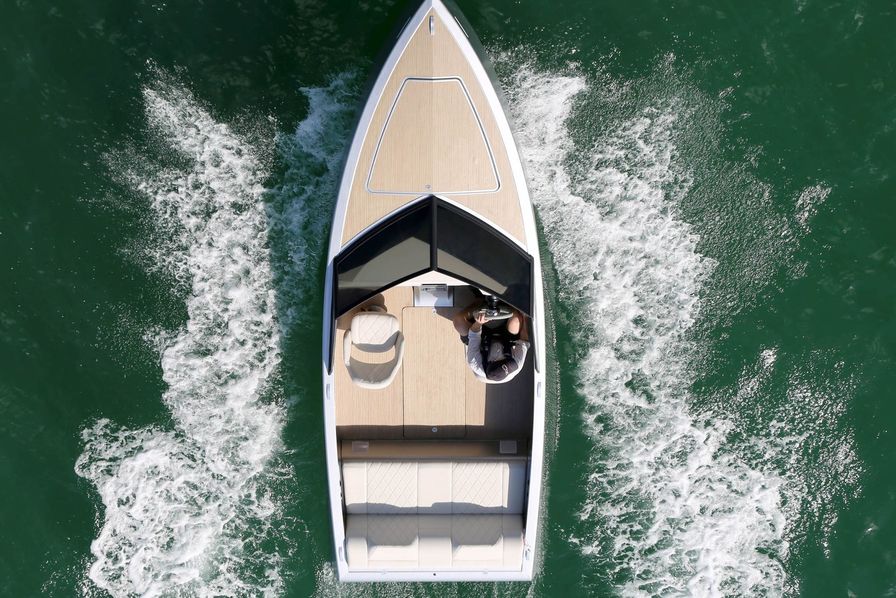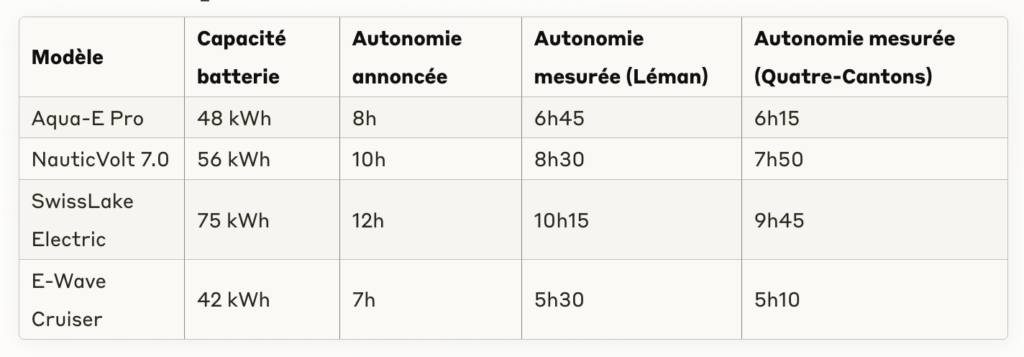Electric boats in Switzerland: Optimum autonomy on our Alpine lakes

The silent revolution on our waters
Electric boating is enjoying an unprecedented boom on Swiss lakes. If you take a trip on Lake Geneva, Lake Zurich or Lake Lucerne, you'll notice the proliferation of these silent craft. But what about their range? Our team has tested the leading models to give you a detailed analysis tailored to the specific conditions of our Alpine waters.
Factors influencing autonomy on Swiss lakes
Alpine weather conditions
Valley winds, foehn and temperature variations have a significant impact on performance. Our tests show a reduction in range of up to 25% during typical windy episodes on Lake Neuchâtel.
Topography and local currents
Unlike lowland lakes, our reservoirs have special hydrodynamic features that place greater demands on the engines:
- Cold currents in glacial tributaries
- Backwater areas near deltas
- Thermal variations creating water movements
Comparison table: Real autonomy (2025)

Gap analysis
Our tests revealed an average difference of 18% between the theoretical range and that observed on Swiss lakes. Performance on Lake Lucerne is systematically lower because of its particular orographic characteristics.
Optimising independence: practical advice
Choice of sailing times
Mornings generally offer the best conditions:
- Calmer waters before the afternoon thermals
- Optimum battery temperature
- Less disruptive boat traffic
Strategic routes
Our GPS plots show that you can avoid it by following the northern banks:
- Areas of prevailing winds
- The strongest currents
- Colder water increases consumption
Maintenance adapted to alpine conditions
The particularly pure water of our lakes requires..:
- Specific maintenance for anodes
- Reinforced protection for electrical connections
- Calibration adapted to variations in conductivity
Charging infrastructure: the state of play in 2025
Current network
<img src=" »/api/placeholder/600/400″" alt=" "Map" des stations de recharge sur les lacs suisses » />
The network has become considerably denser:
- 42 stations on Lake Geneva
- 28 on Lake Zurich
- 35 on Lake Constance
- 22 on Lake Lucerne
Average charge times
Switzerland's port infrastructure now makes this possible:
- Fast recharge (80%): 45 minutes
- Full charge: 2h15
- Top-up charge (20%): 15 minutes
Testimonial: an entire summer in electric
"I travelled over 900 km on Lake Geneva this summer without ever breaking down. The key is to plan your stopovers carefully and know where to recharge. The SwissE-Lake app has changed my experience. - Marco B., owner of a NauticVolt since 2023
Consumption review
- Total cost of electricity: 310 CHF
- Petrol equivalent: around CHF 1,850
- Carbon footprint: reduced by 87%
Cantonal legislation and incentives
Recent developments
The Confederation has harmonised the regulations with:
- Reduced VAT for electric 100% boats
- Preferential mooring rights
- Subsidies for the installation of private charging points
Conclusion: the future is electric, even on our lakes
The range of electric boats on Swiss lakes has reached a decisive milestone. The specific characteristics of our lakes are no longer an obstacle, but rather a source of innovation for manufacturers, who are now adapting their models to our conditions.
The expansion of the recharging network, tax incentives and technological advances mean that 2025 will be a pivotal year for the switch to electric vehicles on our lakes.
Outlook for 2026
Our industry sources confirm that:
- Adaptive batteries to compensate for weather variations
- On-board solar energy regeneration systems
- Predictive algorithms to optimise journeys
The future of Swiss pleasure boating is taking shape silently, on the water and without emissions.
